Prose & Poetry - The Story of John McCrae
 John McCrae is the author of the famed poem, In Flanders Field,
written during the First World War.
John McCrae is the author of the famed poem, In Flanders Field,
written during the First World War.
John was born in 1872 and raised in Guelph, Ontario and is remembered as one of Guelph's most famous sons.
McCrae was more than a poet, and was in fact a doctor, soldier, author and artist.
The paternal grandparents of John McCrae, Thomas and Jean (nee Campbell) emigrated to Canada from Scotland in 1849 and settled in Guelph. Their son David married Janet Eckford and they had three children; Thomas (1870), John (1872) and Geills (1878).
John's early education was received in Guelph, first at Central Public School and subsequently at Guelph Collegiate Institute.
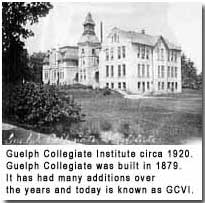 While
at Guelph Collegiate, John joined the Highland Cadet Corps
which was affiliated with the school.
While
at Guelph Collegiate, John joined the Highland Cadet Corps
which was affiliated with the school.
One year later, at the age of 15, McCrae became a bugler in the local militia regiment of artillery commanded by his father. He later joined this same regiment as a gunner.
At the age of
16, John was awarded a scholarship to the University of Toronto (left photo)
due to his academic achievement at Guelph Collegiate. McCrae attended
classes at the University of Toronto until 1892-3, when
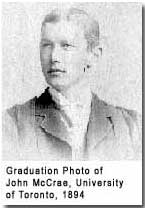 he
took a year off his studies due to recurring problems with asthma.
During this break from university John was a resident master in English and
Mathematics at the Ontario Agricultural College (O.A.C.)
in Guelph.
he
took a year off his studies due to recurring problems with asthma.
During this break from university John was a resident master in English and
Mathematics at the Ontario Agricultural College (O.A.C.)
in Guelph.
After returning to Toronto and completing his B.A., John
commenced studies in medicine at the University of Toronto and did a medical
residency at the Garrett Hospital, a Maryland children's convalescent home.
While at university, John maintained his military ties with the No. 2
Battery in Guelph. He remained a member of the Guelph militia regiment
and was promoted several times, finally making the rank of Lieutenant.
At the same time he was also involved with a Toronto militia, the Queen's
Own Rifles, in which he rose to the rank of Captain and commanded the
company.
It was also while John was still at University that some of his early poems were first published.
Although McCrae is widely known as a poet, his literary efforts were not confined to one genre.
While at university he also had some of his short stories published and he later went on to write scientific articles and medical textbooks. As well as his literary efforts, John dabbled in the visual arts, making numerous sketches throughout his life.
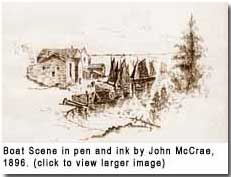 John McCrae
graduated at the top of his class in medicine at the University of Toronto,
and in 1899 was awarded a fellowship in pathology to McGill University in
Montreal. This award coincided with the start of the Boer War
(1899-1902) and John put off accepting the fellowship in order to go to
South Africa with the artillery. McCrae left for South Africa in 1900
in command of the left section of D Battery of the Royal Canadian Artillery
attached to the Second Canadian Contingent. This contingent returned
to Canada in 1901 after participating in several major campaigns. With
his return McCrae accepted the fellowship at McGill, which he completed in
1905.
John McCrae
graduated at the top of his class in medicine at the University of Toronto,
and in 1899 was awarded a fellowship in pathology to McGill University in
Montreal. This award coincided with the start of the Boer War
(1899-1902) and John put off accepting the fellowship in order to go to
South Africa with the artillery. McCrae left for South Africa in 1900
in command of the left section of D Battery of the Royal Canadian Artillery
attached to the Second Canadian Contingent. This contingent returned
to Canada in 1901 after participating in several major campaigns. With
his return McCrae accepted the fellowship at McGill, which he completed in
1905.
 While
still working on this fellowship, McCrae was appointed special professor in
pathology at the University of Vermont, a position he held until 1911.
While
still working on this fellowship, McCrae was appointed special professor in
pathology at the University of Vermont, a position he held until 1911.
During this time he was also appointed an associate of medicine at the Royal Victoria Hospital in Montreal and was a lecturer in pathology and medicine at McGill University. After completing the fellowship McCrae was employed as a pathologist at Montreal General Hospital and as a physician at the Royal Alexandra Hospital for Infectious Diseases, also in Montreal.
In 1910, Lord Grey, then Governor General of Canada, undertook an expedition by canoe from Lake Winnipeg to Hudson's Bay. John McCrae accompanied this voyage as expedition doctor.
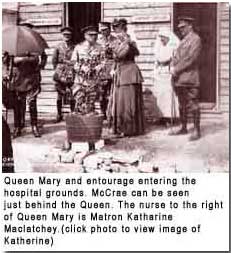 When
the first World War began in 1914, McCrae again offered his services to the
military. He was conditionally offered the position of Brigade Surgeon
in the First Brigade of Canadian Field Artillery by E.W.B. Morrison, the
brigade commander and a friend of McCrae.
When
the first World War began in 1914, McCrae again offered his services to the
military. He was conditionally offered the position of Brigade Surgeon
in the First Brigade of Canadian Field Artillery by E.W.B. Morrison, the
brigade commander and a friend of McCrae.
McCrae was formally confirmed in this position in the fall of 1914. While Brigade Surgeon, John was responsible for a field dressing station at the front and treated those wounded during the Second Battle of Ypres (Ieper) in the spring of 1915. As well as performing his duties as surgeon, he also served on the guns when needed and occasionally performed burial services.
It was after performing the service for a friend, Alexis Helmer, that McCrae was inspired to write In Flanders Fields. The poem was written May 3, 1915 and first published in Punch that same year.
In the summer of 1915, McCrae was transferred from the artillery Brigade to the Number 3 Canadian General Hospital in France, where he was second in command of medical services. During McCrae's time there, the Number 3 Hospital received a visit from Queen Mary, who toured the hospital. McCrae disliked these official visits as he felt they detracted from the real work of the hospital.
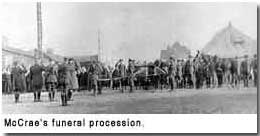 While
still at this hospital in January 1918, McCrae became ill with pneumonia,
which was soon complicated by meningitis.
While
still at this hospital in January 1918, McCrae became ill with pneumonia,
which was soon complicated by meningitis.
Four days before he died, he was honoured by being the first Canadian appointed as consulting physician to the First British Army. John McCrae died on 28 January 1918, and was buried with military honours at Wimereaux Cemetery in France. At McCrae's funeral procession, 75 nursing sisters stood by to watch and McCrae's horse, Bonfire, wore his master's boots backwards in military tradition.
Article contributed by John Peddie, website Guelph Museums - McCrae House.
French tanks were used for the first time in battle on 17 April 1917, when the 'Char Schneider' (as they were known) was used during the Second Battle of the Aisne.
- Did you know?
